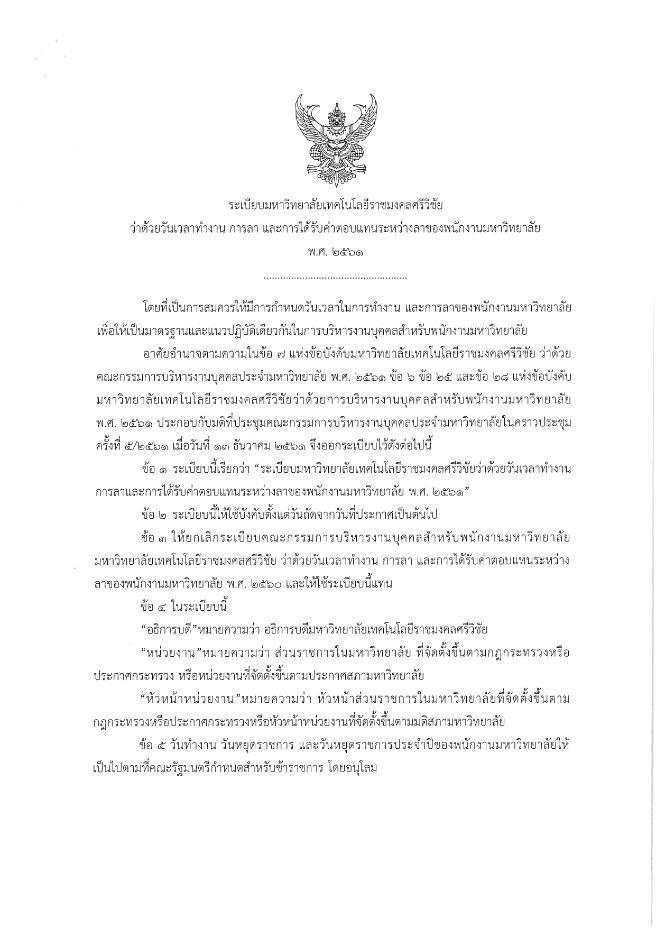Reporters : Dr.Wichulada Thavaroj,Ms. Rungtip Rattanapon,Miss Panyaras Luekhajon,Asst.Prof.Noppadon Podkumnerd
Evidence Date: May 2022
Indicator : 2.2.1 , 2.2.2.1,and 2.2.2.2
Related SDGs:

The provision of food services in the university is carried out by external service providers, with detailed operational conditions specified in a contractual agreement. These conditions are established under the criteria outlined in the announcement of the Rajamangala University of Technology Srivijaya regarding criteria, terms, and methods for the rental rates and maintenance costs of property under the university’s care, within the Songkhla district. The rental rates and maintenance costs of property under the university’s care are set in the year. 2022. This is further regulated by a committee responsible for leasing properties, following the university’s order number 956/2023. This committee oversees and ensures that businesses complying with the university’s criteria operate under the specified standards. Within the university, there are various food establishments in 3 campuses. There are 7 main food service areas, including:
Central Cafeteria, Songkhla
Faculty of Engineering Cafeteria
Faculty of Industrial Education Cafeteria
Central Cafeterias, Nakhon (2 cafeterias)
Central Cafeteria, Trang
Small food kiosks
Rental food shop
Convenience stores.
Table 1 Number of food service points in the university indicated by service type
Type of food service point | amount (point) |
| Canteen | 7 |
| Kiosks serve snacks and drinks | 6 |
| Restaurant (rental) | 5 |
| Convenience store | 2 |
Table 2 Number of food service shops in the university indicated by type shop
| Type of food service | Amount (shop) |
| Main food | 32 |
| Snack shop | 11 |
| Drink shop | 10 |
| Convenience shop | 2 |




Faculty of Engineering canteen in Songkhla


Faculty of Industrial Education and Technology canteen in Songkhla


RUTS canteen in Nakornsithammarat 1st place




RUTS canteen in Nakornsirthammarat 2nd place






RUTS canteen in Trang




Furthermore, there are food service points in the form of food kiosks and beverage outlets. The leased food establishments, as well as convenience stores, are capable of serving approximately 4,500 individuals, including students and staff in the Rajamangala University of Technology Srivijaya, Songkhla area. Out of a total of 14,961 people. Which is sufficient for daily service to students and staff within the Rajamangala University of Technology Srivijaya, based on approximately 20% of university’s population utilization.
Table 3 Total amount of food waste collected from every type of food service point
| Type of food service point | Trash (bin) | Weight (ton) (0.0175 ton/bin) |
| RUTS canteen | 8 | 0.14 |
| Faculty of Engineering canteen | 5 | 0.0875 |
| Faculty of Industrial Education and Technology canteen | 5 | 0.0875 |
| RUTS canteen in Nakornsrithammarat | 8 | 0.14 |
| RUTS canteen in Trang | 6 | 0.105 |
| Kiosks serve snacks and drinks | 4 | 0.07 |
| Restaurant (rental) | 2 | 0.035 |
| Convenience store | 1 | 0.0175 |
| Total | 39 | 0.683 |
| Organization (unit) | Quantity (person) | 20% of population | Total of food waste per day (ton) | food waste per unit per day (ton) |
| Head office | 335 | 335 (100%) | 0.683 (Average per person is around 0.000171 ton) (calculated by 20% consumers) | 0.057 |
| Faculty of Industrial Education and Technology | 770 | 193 | 0.033 | |
| Faculty of Business Administration | 3,376 | 844 | 0.14 | |
| Faculty of Engineering | 2,504 | 626 | 0.11 | |
| Faculty of Liberal Arts | 1,877 | 470 | 0.08 | |
| Faculty of Architecture | 610 | 153 | 0.026 | |
| Faculty of Science and Technology | 715 | 179 | 0.031 | |
| Faculty of Agriculture | 793 | 199 | 0.034 | |
| Faculty of Management Technology | 1,313 | 329 | 0.056 | |
| Faculty of Veterinary Medicine | 290 | 73 | 0.013 | |
| Faculty of Agro-Industry | 189 | 47 | 0.008 | |
| Faculty of Science and Fisheries Technology | 467 | 117 | 0.02 | |
| Faculty of Engineering and Technology | 468 | 117 | 0.02 | |
| Collage of Hospitality and Tourism | 488 | 122 | 0.022 | |
| College of Industrial Technology and Management | 462 | 116 | 0.02 | |
| Rattaphum College | 304 | 76 | 0.013 | |
| Total | 14,961 | 3,996 | 0.683 |
The food waste is effectively managed by repurposing it as animal feed. External operators from outside the university oversee this waste management process, which is regulated by a central department responsible for managing leasing activities at the university, aimed at creating various forms of benefits.
Food waste management




Related link:
https://drive.google.com/file/d/1zEFmkCa1sFGemE5JFi4QDm4Sb-w9f59O/view?usp=sharing
Information Source: Rajamangala University of Technology Srivijaya



